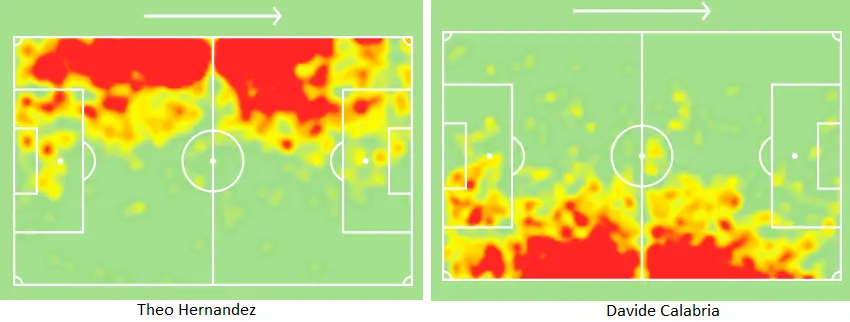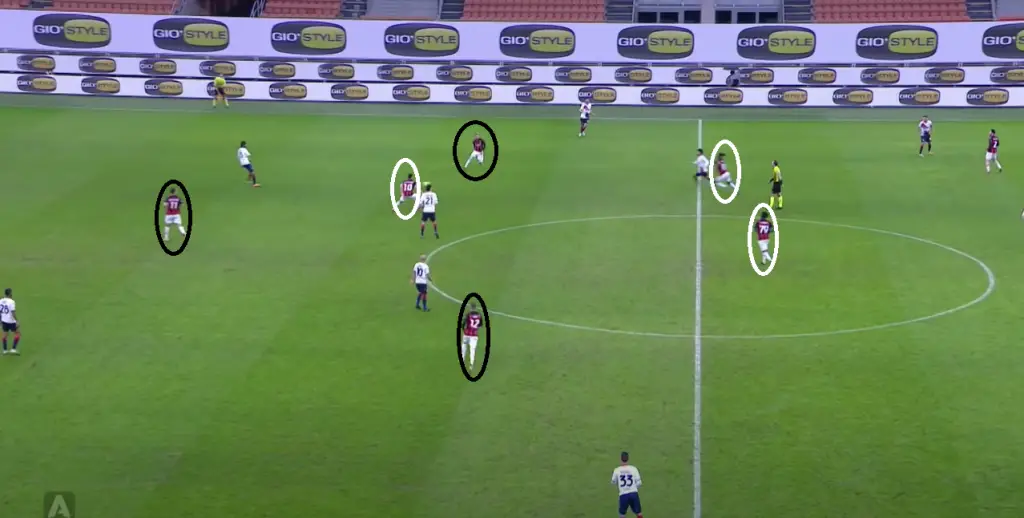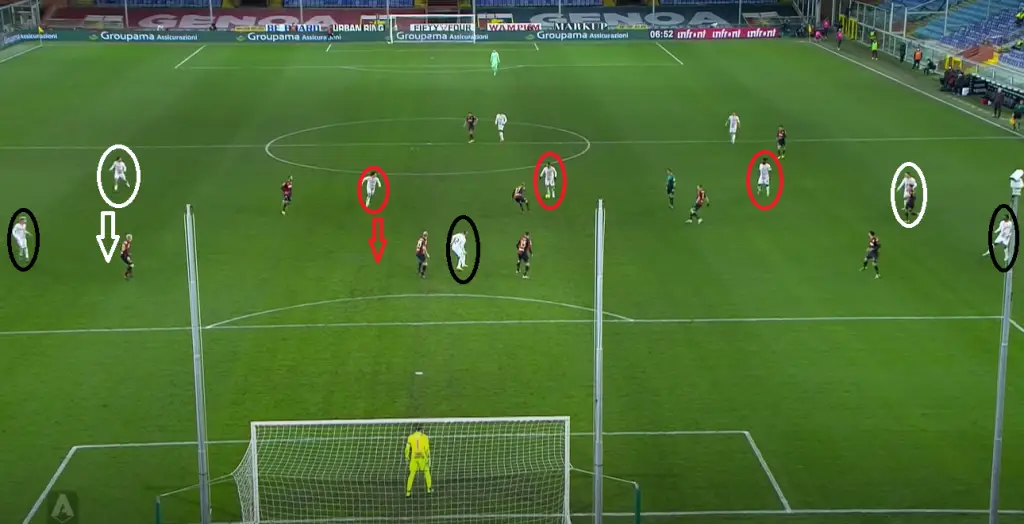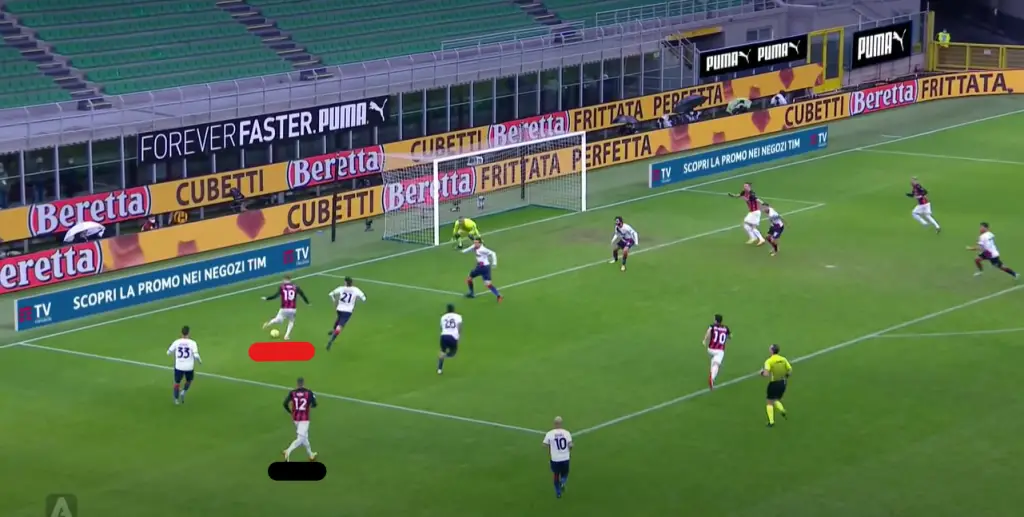Manchester United and AC Milan have drawn each other in the UEFA Europa League round of 16. The two giants of the game have 10 European cups between them. The Premier League side comfortably saw through Real Sociedad in the round of 32, while Rossoneri edged past Red Star Belgrade on away goals.
But United would know that the Serie A side could be a trickier opponent than Sociedad. Milan, after all, led their league table for the majority of this season and currently sit 2nd, just 4 points behind rivals Inter Milan.
What can Manchester United expect?
4-2-3-1 as a rule
What can the Red Devils, the team as well as the fanbase, expect to see from the Italians? Let’s understand how manager Stefano Poli sets up his side, and what roles his players play.
To begin with, the Italian side are strict adherents of the 4-2-3-1 formation. This is a philosophy they have implemented in all of their games this season, irrespective of the competition. But the formation becomes interesting to note once we see the Milan players’ roles in it.
The centre-backs
Milan line up with the centre-back pairing of Simon Kjaer of Denmark, and Italy international Alessio Romagnoli.
The dangerous full-backs
These are the trusted pairings used by Poli. This can be seen in the image below. And talking about defenders, his main weapons in the 4-2-3-1 system are David Calabria at right-back, and Theo Hernandez at left-back.

While the two drive forward to support the wide midfielders, Hernandez is the most potent threat and one who is responsible for a lot of their creativity. The Frenchman has 5 goals and 6 assists in all competitions already.

Hernandez is also in the top-5 in the Milan side this season when it comes to xA (expected assists) and KP90 (key passes per 90 minutes), as shown in Image A above. As the heatmap below shows, Hernandez sees more activity than Calabria, and hence the output.

The midfield

As the 4-2-3-1 formation usually entails, the midfield five is a diversified bunch in terms of position. Milan play a double pivot, usually of Frank Kessie and Sandro Tonali/Ismael Bennacer behind a No.10 in Hakan Calhanoglu. The wide midfielders are Alexis Saelemaekers and Ante Rebic/Rafael Leao.
Their midfield shape is best visible in the photos below in a Serie A match against Genoa, which they drew 2-2. The first photo shows Milan when they are not in possession. The players circled in black are their front three. The front-most player in the white circle is their attacking midfielder, while their double pivot is clearly visible too.
The full-backs are tucked in (not visible in the image as a result) and form a stable back-four. So unless a team wins possession high up the field, Milan’s full-backs would generally be in possession.

The next picture, seen below, is the formation when they attack. The ones circled in black are their front 3. They hold their positions and interchange very less unless the action takes place very close to the box. The ones circled in white are their attacking fullbacks. The players in circled in red are their midfielders.
The one in possession is their playmaking midfielder. You can also see a runner from the midfield (Tonali) making the run (with the red arrow) and the one on the right is Kessie, their staunch defensive midfielder who rarely goes up to attack.

The attack

In attack, they have former Manchester United striker, Zlatan Ibrahimovic. And he really is the star of the show when it comes to goal-scoring. The Swedish giant has 16 goals in 20 appearances so far. And as visible in Image B, he has the best xG and Sh90 (shots per 90 minutes). He is the threat.

Playing behind him is Hakan Calhanoglu. No player has more assists than him this season in the Serie A after 23 games. As visible in Image B, he leads the xA (expected assists) and xA90 stat by a handsome margin. And his heatmap further highlights that his movement cannot be predicted. The Turkish maestro is seen all across the pitch in the attacking third.

Their wingers, Saelemaekers, Leao, and Rebic, function like traditional wingers, but interesting patterns emerge when seeing their heatmaps in Image C. For example, the two most used left-wingers, Leao and Rebic, are way more involved in attack than in defence as compared to Saelemaekers. This will become important when we get to the conclusion.

Their attacking pattern, as seen in Image C, is also pretty vivid. Milan take almost 4/5th of their shots down the middle, showing that they tend to converge their attacks. Moreover, scoring a massive 10 penalties this season also underlines that their tricky attackers need to be dealt with carefully.

Verdict
Going by the above analysis, United would know what to expect. Milan play a solid 4-2-3-1 which ensures they have enough men in attack while not being susceptible to counters as Kessie stays back when the team attacks.
The Serie A side have a very attacking left-wing, where their left-back attacks and their left-wingers don’t drop back so much to help out the defence (refer to the content above).

Milan also have a very high dependence on Calhanoglu and Hernandez for chance creation, and Ibrahimovic for scoring goals. If United are careful with these three, they can stifle Milan to a great extent.
However, given that Ibrahimovic is a doubt for the first leg, it remains to be seen if he plays. Nevertheless, these are the things that United can expect from Milan.
Read More:
- Why Manchester City should swoop for Harry Kane in the summer
- Why Manchester City should change their stance on Douglas Luiz
At the end of the day, luck plays a part in any football game, but if United are careful in studying their opponents, they can work their way around this rejuvenated Milan side.
The Red Devils, as their history also suggests, should fear no one. But silverware is not easy to come by anymore. They need to be at their best in order to land their first trophy under manager Ole Gunnar Solskjaer.

